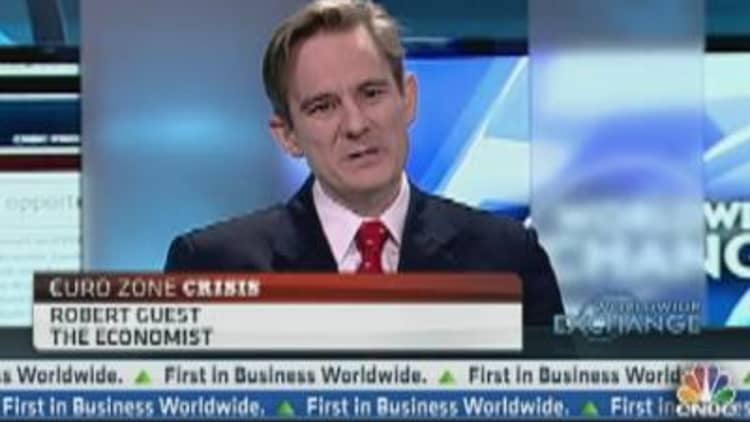Optimism about some better-than-expected economic data from Europe is likely to be short-lived and the euro and European stocks will remain under pressure as investors will again turn their attention to the fact that the euro zone's debt problems are far from over, analysts told CNBC.com.
The euro rose for the first time in three trading sessions on Tuesday and European stocks hit a five-month highon a combination of Chinese and European data, but the gains may be just temporary, according to analysts.
European shares retreated again Wednesday morning, as Greece was resuming efforts to persuade private sector investors to accept a debt swap to help it avoid a costly default.
"I think the euro is in a down move. I think all the fundamentals about the euro land are still on topic, nothing is solved," Felix Adam, a currencies analyst at ACT Currency Partners in Zurich said in a telephone interview. "In the short term we have some good news."
On Tuesday, German investor sentiment posted its biggest jump ever, to -21.6 from -53.8, and yields in an auction of Spanish T-bills halved, prompting a rise in European stocks and in the euro.
But Ben May, European economist at Capital Economics, noted that Germany's closely-watched ZEW economic survey had been conducted before the euro zone sovereign rating downgrades by Standard & Poor's late on Friday.
"I think the thing to bear in mind was that the [ZEW survey] headline was still in the negative territory. In that sense it's still not painting an encouraging picture," May told CNBC.com.
Adam pointed out that the euro has to face its first crisis in its short history and European leaders do not seem able to deal with it as efficiently as policymakers in the US have dealt with the financial crisis.
"Some countries are really not in good shape and this is a new situation… maybe America is better at managing crises because they have a more efficient administration," he said. "Definitely something has changed in the euro land."
Concerns 'Will Inevitably Rumble On'
Despite the sharp fall in short-term yields, "concerns about the debt crisis will inevitably rumble on," May said.
"Our view is that there are still a lot of problems in Spain and Italy and that concerns about their growth prospects will intensify," he added.
Markets work well because "there so much liquidity" in the US and Europe, and this is also why yields in auctions of short-term debt held by troubled euro zone countries have been coming down, according to Adam.
"At the moment all the action they [the European Central Bank] take is put money in the markets to make everybody happy but I do not see how this solves issues in the long-term," Adam said.
"Greece is not solved, Spain is not solved… give them a month or two and there is more bad news around the corner," he added.
An official from rating agency Fitch said on Tuesday that Greece is likely to default, but the default will be an orderly one, wherein private sector investors (PSI) agree to take a "haircut," in popular financial parlance, on the returns they will receive from Greek bonds.
Analysts told CNBC that even if Greece succeeds in reaching a deal with private investors holding its bonds, this may not help it as the recession that has hit the country means its debt-to-gross-domestic-product ratio will not be lowered by as much as the country wants.

"Essentially [Greece] will default over the next couple of months. Either it will be in a voluntary form with this PSI deal or, if this breaks down, it will be disorderly," May said.
German Chancellor Angela Merkel and French President Nicolas Sarkozy are "forced" to think for Greece, because the country doesn't seem able to find a way to get its citizens to pay their taxes and thereby cover the huge debt, Adam said.
"Greece has to solve its tax issues, the debt problems… they need to have a new authority coming in. I don't know how you solve that," he said.
Reports of rich Greeks hiding their swimming pools under tarpaulins or sending money abroad to dodge taxes, and Italian tax collectors discovering drivers of Ferraris who declared incomes of less than 30,000 euros ($38,190) a year have circulated widely since the crisis started.
"They [Greece and Italy] have to find a way to make people pay tax," Adam said. "If you ask only all the poor people to pay the bills, that's not workable."

